Riga Stradiņš University
Rīga Stradiņš University (RSU) (Latvian: Rīgas Stradiņa universitāte, Latin: Universitas Rigensis Stradina) is a public university located in the city of Riga, Latvia. The Stradiņš (pronounced [ˈstradiɲʃ]) name in the university’s title is owed to members of the Stradiņš family who have had a significant influence on the course of community and academic life in Latvia for over a century. Rīga Stradins University has appointed JSP Global solutions , Chennai to recruit students from India
Rīgas Stradiņa universitāte | |
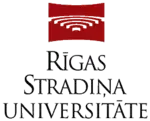 | |
| Latin: Universitas Rigensis Stradina | |
Former names | Riga Medical Institute, Medical Academy of Latvia |
|---|---|
| Motto | Ars longa, vita brevis (Latin) |
Motto in English | Art is long, life is short |
| Type | Public |
| Established | 1950 |
| Rector | Aigars Petersons [1] |
Academic staff | 445 (2017)[2] |
Administrative staff | 445 (2017)[2] |
| Students | 8,670 (2017)[3] |
| 150 (2017) | |
Other students | 2,104 international (2017)[3] |
| Address | 16 Dzirciema Street , , |
| Campus | Urban |
| Colours | Red White Silver |
| Nickname | Stradiņi, RSU |
| Website | www |
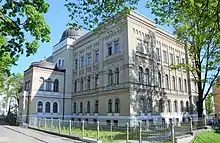
Rīga Stradiņš University
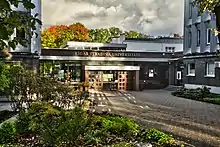
In 1950, Riga Medical Institute was established on the basis of the Faculty of Medicine of the State University of Latvia. The initiators were professors Pauls Stradiņš (1896–1958) and Ernests Burtnieks (1950–1958) - the first Director of Riga Medical Institute, and Healthcare Minister of the Republic of Latvia Ādolfs Krauss. Initially the institute included the faculties of medicine, dentistry and pharmacy, as well as 45 departments.
Rīga Stradiņš University is a state-funded university which offers various study programmes and ensures the realisation of scientific projects, providing training of experts in health care and social sciences who work in Latvia and across the world. It is the only university in Latvia which has traditionally been integrated into the healthcare system of the country, and therefore ensures a successful run of the university, which is a precondition for an effective existence of the health care system in Latvia.
RSU is autonomous and academically free to pursue its goals and tasks, working for the benefit of the state and society, and offering a wide array of academic and professional education and research opportunities in the fields of health care, social care, social sciences and natural sciences.
Riga Stradiņš University is not ranked in the top 1000 universities in the world, and not in the top 450 universities in Europe, as of 2019.[4]
History
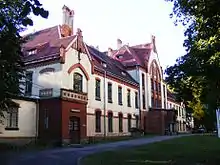
On 2 February 1920, Swedish professor Gaston Bakman held the first lecture on human anatomy in the Theatrum Anatomicum Rigense (currently Anatomical Theatre in Riga). This lecture was the forebearer of higher education in medicine in Latvia. Professor Gaston Bakman believed that this was also the beginning of the Institute of Anatomy and Histology, as well as the Museum of Anatomy in Riga.
After World War II, only two professors of medicine remained in Latvia, one of whom was Professor Pauls Stradiņš, who in a very short time as the Dean of the Faculty of Medicine managed to rebuild and renew the education and science of medicine from scratch. In 1950, during the Soviet occupation the Riga Medical Institute (Latvian: Rīgas Medicīnas institūts; Russian: Рижский медицинский институт, romanized: Rizhskiy meditsinskiy institut; Latin: Institutum Medical Riga) was established on the basis of the Faculty of Medicine of the State University of Latvia. Initially the institute included the faculties of medicine, dentistry and pharmacy, as well as 45 departments.
In 1990, the Institute was renamed Medical Academy of Latvia (Latvian: Latvijas Medicīnas akadēmija, Latin: Academia Medicinaei Latviensis), but already on 5 April 1998, the Constitutional Assembly made the decision to rename Medical Academy of Latvia, based on its actual activities as Rīga Stradiņš University. Rīga Stradiņš University in time developed into a university type higher education institution, as it trains experts not only in the fields of medicine and pharmacy, but also offers study programmes in social sciences, natural sciences, public health and law. On 13 June 2002, Rīga Stradiņš University Act came into effect and Medical Academy of Latvia was renamed Rīga Stradiņš University.
Structure
Rīga Stradiņš University's nine faculties provide undergraduate as well as postgraduate level studies in various programmes. High school students as well as doctors of science have the opportunity to study at RSU and enhance their education, and make a contribution to the creation of knowledge and new technologies.[5]
Currently there are 9 faculties at RSU:
Medical Sciences:
- Faculty of Dentistry
- Faculty of Medicine
- Faculty of Pharmacy
- Faculty of Public Health and Social Welfare
- Faculty of Rehabilitation
Social Sciences:
- Faculty of Communications (including Department of Communication Studies and Department of Sociology)
- Faculty of European Studies (including Department of Political Science and Department of Economics)
Law:
- Faculty of Law
Post-graduate departments:
- Faculty of Continuing Education
- Division of Doctoral Studies
There is also a department for international students studying at RSU:
- International Student Department
University students can choose full-time studies, which require undivided attention as well as part-time studies, which can usually be combined with work. Medicine and health care students at various levels of study can access state budget funded study places, whereas the best social science students receive discounts on their tuition fees.[5]
Liepāja Branch:
Rīga Stradiņš University (RSU) Liepāja branch is the place where for over 70 years various health care professionals have been trained. Currently the RSU Liepāja branch offers first level professional higher education in health care, offering the following programmes: Medical massage, Nursing, Physicians' Assistant and Health Sport Specialist with approximately 200 students enrolled. Health care specialists may also choose the Bachelor's study programme Nursing and the Master's study programme Nursing.[6]
Study programmes Nursing and Health Sport Specialist offered at RSU Liepāja branch are identical in terms of content to the study programmes that are offered at RSU in Rīga. Following placement, most students start working in the same health care institutions where placement was completed. [7]
Students and teaching
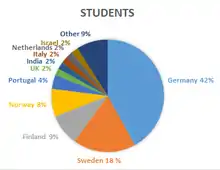
RSU has a student teacher ratio of 1:10. The total number of students is approximately 7,000, while the total number of RSU employees stands at around 1,000, with 370 academic staff members. The language of instruction at RSU is primarily Latvian, however an increasing number of faculties and departments additionally offer programmes in English for international students studying Medicine, Dentistry, Pharmacy, Nursing, Physiotherapy, Public Health, Health Management etc. One third of all international students in Latvia study at RSU and currently international students constitute more than 24% of the student body of the university.[3] In 2017 42% of foreign students came from Germany, 18% from Sweden, 9% from Finland and 8% from Norway.[3] In the same year, 88% of foreign students studied in the Faculty of Medicine and 11% in the Faculty of Dentistry.[3]
The Riga Stradiņš University is not ranked in the top 1000 universities in the world, nor the top 450 universities in Europe, as of 2019.[4]
The same applies to the teaching methods and technology solutions for students studying dentistry. The dental programme is implemented in the University’s pre-clinical learning centre, where dentistry students start practicing on pre-clinical dental equipment already in their 1st year, alongside more theoretical subjects like anatomy, biochemistry, biology and microbiology. The initial learning phase takes place in the virtual environment on various 3D simulators, which help students adjust to dental equipment and the features they provide. In the 2nd year, students start practicing on pre-clinical dental equipment, which is fitted with phantom heads, which simulate a real dental care unit and allow learning the correct working ergonomics from day one.
Rectors
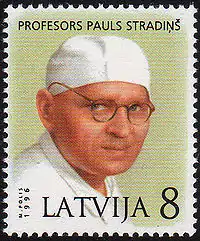
- Ernests Burtnieks (1950–1958)
- Vasilijs Kalbergs (1958–1963)
- Vladislavs Korzāns (1963–1992)
- Jānis Vētra (1992–2007)
- Jānis Gardovskis (2008 - 2017)
- Aigars Pētersons (since 2018 until present)
Notable alumni
RSU alumni include many prominent doctors and members in the society, including many former and present politicians, e.g.:
- Ingrīda Circene, former Minister for Health, 2003-2004, 2011-2014
- Gundars Daudze, former Speaker of the Saeima, 2007-2010
- Baiba Rozentāle, former Minister for Health, 2009-2010
- Maira Sudrabiņa, Chancery of the President of the Republic of Latvia, Secretary of the Chapter of Orders
- Valdis Zatlers, President of Latvia, 2007-2011
- Georgs Andrejevs, former Minister of Foreign Affairs, 1992-1994
- Juris Bārzdiņš, former Minister of Health, 2010-2011
- Jānis Birks, former Mayor of Riga, 2007-2009
- Teodors Eniņš, pioneer of magnetic impulse therapy, activist and co-chairman of the Popular Front of Latvia, former Minister of Welfare
- Didzis Gavars, former Minister of Health, 2010
- Jānis Straume, former Speaker of the Saeima, 1998-2002
- Boris Teterev, philanthropist behind the Boris and Ināra Teterev Foundation
- Ilze Viņķele, former Minister of Welfare, 2011-2014, McCain Institute scholar
References
- "Rīga Stradiņš university Professor Aigars Pētersons elected rector of RSU. Opened January 22, 2018". Retrieved 29 May 2019.
- Latvijas Republikas Izglītības un zinātnes ministrija. Augstskolu un koledžu personāls
- "International Student Department". www.rsu.lv. Retrieved 29 May 2019.
- "World University Rankings". Times Higher Education (THE). 26 September 2018. Retrieved 29 May 2019.
- https://www.rsu.lv/en/liepaja-branch
- https://www.rsu.lv/en/liepaja-branch
